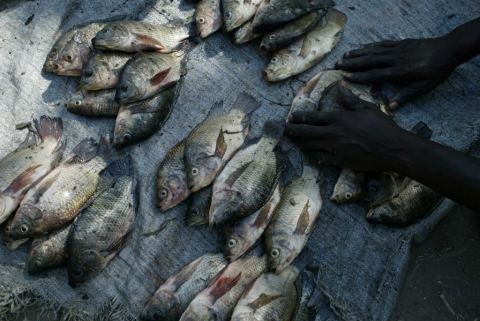While youth comprise about 70 percent of the population in Malawi, most of them contend with poverty and HIV/AIDS and lack access to the necessary opportunities to empower and change their lives.
Realizing the potential in Malawi's young people, the Kawjo Foundation has charged the youth with the management of the Integrated Agriculture-Aquaculture (IAA) project in the Lilongwe district. IAA is a sustainable agricultural strategy that allows rural communities to adapt to erratic weather causing rainfall shortages by increasing the long-term availability of water. IAA—one of the prioritized adaptation strategies within Malawi's National Adaptation Program of Action (NAPA) established in 2006—promotes sustainable farming and food security in the region by allowing farmers to adapt better to climate change. The project, Scaling up Adaptative Capacity of Rural Communities to Climate Change through Innovative Integrated Agriculture Aquaculture (IAA), has been in operation for two years.
The youth who have played an essential role in IAA project management have also been inspired to become more involved with aquaculture. Gricellia, an 18-year-old fish farmer supported under this grant, is notable for being the only girl among many men and women involved in the project. Fish farming has enabled Gricellia to feed and clothe her family.
"[...] The benefits have given me courage, and I am convinced of getting more if I work harder with support from our officers." says Gricellia. "It gives me happiness just to think that I have money kept in the pond.” Gricellia initially shared a pond with three other project members but now is the sole owner of a pond of 300m2 (300 cubic meters?).
IAA is both economically and ecologically efficient, because the waste generated throughout each stage of the farming process is recycled back into the system. Farm ponds effectively convert most organic waste into fish protein and/or nutrient-rich water and mud without the challenges normally associated with terrestrial mulches and green manures (including disease and weed and insect infestations). Farmers can use waste generated from their livestock and crops to fertilize the farm ponds, and the water and mud in the ponds allows them to extend the growing season in the gardens adjacent to the ponds.
The project aims to reach and enhance the adaptive capacity of at least 250 households through the construction of at least 50 IAA fish ponds. During the first phase of project implementation, Zione and Ruth, 23 and 24 respectively, facilitated the construction of 36 IAA system fish ponds. A special function was held to commemorate the first harvest—which took place in May—where the Senior Chief Chadza praised the Kajwo Foundation as a “kasupewachitukuko” ("fountain of development").
The Kawjo Foundation has further embraced the vital role that youth play in the future of aquaculture by offering 35 youth free training in aquaculture, including topics such as pond construction, fish stocking, and pond management, and harvesting.
The young women leading this project face several challenges as they work with farmers consisting mostly of older men and women. The most frequent challenge involves convincing older farmers of the benefits of IAA. However, they remain optimistic that the combined enthusiasm of the youth and comprehensive technical expertise that have driven the project's success will allow them to continue working with and changing the lives of vulnerable, low-income farmers in Malawi.
by Zione Makawa and Ruth T. Kaunda, YPARD Malawi members

